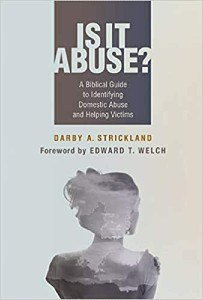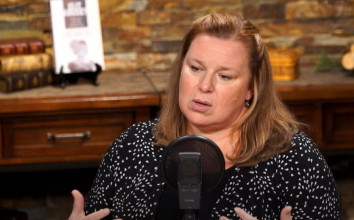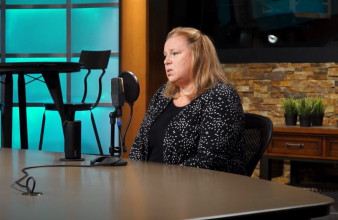Teaser:
Woman #1: I don’t know what’s going on with Kristen. We used to be good friends but she’s been so guarded lately.
Woman #2: I know, I’m concerned about her. She seems shaky and nervous all the time.
Woman #1: Yeah, when I asked her to lunch, she said she couldn’t make it. It seems like she barely leaves the house.
End of Teaser
John Fuller: Well, I wonder if you’ve had a similar experience. That you can tell something is off with that friend, but they feel really out of reach. Today on Focus on the Family, we’ll have some advice on an important topic: how to walk alongside a friend who’s in an abusive marriage. Your host is Focus president and author, Jim Daly. And I’m John Fuller.
Jim Daly: John, many people are unaware of the hidden reality of abuse. Uh, about 75% of Americans will know someone who is a victim of domestic violence over the course of their lifetime. And there’s a good chance you know someone at church, or at work dealing with this. And as a friend, you’re in a natural position to help. And most people trapped in abusive marriages won’t seek out counselors, but they’re much more likely to talk with a trusted friend.
John: Yeah, that’s the basis. That relationship is the basis for feeling safe in, in sharing that. And we should acknowledge that, uh, abuse does go both ways. There are men listening who are suffering in an abusive relationship. And we do care about your situation, of course.
Jim: That’s right, John, and we want men to know we hear you. We’ll hear from some that feel we didn’t cover that today. Uh, today’s program will apply to everybody’s situation in many ways. Uh, but the focus of our conversation will be women, who make up 85% of domestic abuse victims. And our guest today specializes in counseling those women specifically.
John: That’s right. Uh, Darby Strickland is in a great position to offer help on the topic. Uh, she’s a counselor and author, and her book is a great resource for every Christian. It’s called Is It Abuse? A Biblical Guide to Identifying Domestic Abuse and Helping Victims. Of course, we have that here at the ministry. Just call 800, the letter A, and the word FAMILY.
Jim: Darby, welcome to Focus on the Family for the first time. It’s great to have you.
Darby Strickland: Thank you. It’s an honor.
Jim: This is really, uh, you know, a difficult topic when we talk about abuse.
Darby: Mm-hmm.
Jim: And abuse is defined in so many different ways. Uh, you’re a counselor and, and you work regularly with victims of abuse. What would they want people outside of their situation to know? It’s a good opening question. What does that abused person feel in their heart?
Darby: Yeah, that’s a great question because I think the experience of a victim is often confused. Oftentimes, they don’t even recognize that they’re being abused. Um, they’ve probably… When I’ve encountered them, they’ve probably read every marriage book, prayed every prayer, gone to friends and asked for help with specific things in their marriage. But, uh, they know something’s not right. They can’t put their finger on what it is. Uh, they often think things are their fault. Um, their husband’s always angry and they just can’t make sense of their world. So I think the abuse victims that I work with, really just benefit when we slow down and we’re asking them careful questions, drawing out individual stories about what’s happening in their home. Helping them try to make sense…
Jim: Yeah.
Darby: … of what’s occurring.
Jim: And Darby, in that regard, um, you do encourage Christians broadly to be better equipped to hear the signs, if I could say it that way, of abuse and to understand them. That’s a bit of a, a big request because, you know, if you’re living in, you know, a comfortable environment, and your family’s doing well, and you’re going to work, and life is pretty good-
Darby: Mm-hmm.
Jim: … this is a challenge to be tuned in to those around you, your friends and neighbors who might be in an abusive situation. Describe that desire.
Darby: Yeah, I think on three fronts, really. One is we don’t see abuse happen, right? It happens behind closed doors. So we’re not cued in. Secondly, I think we don’t see it because it’s a problem of imagination. I can’t imagine that the woman sitting next to me in a pew, I know her husband. I can’t imagine the brutal cruelty that she’s facing at home.
Jim: Right.
Darby: Or the coercion, or, uh, things being thrown at her. Because I don’t look or perceive her husband that way.
Jim: Yeah.
Darby: Um, and I think it’s an important call because I think it’s what God asks of His people, um, to care for, um, the oppressed and the vulnerable. Those people on His heart in Scripture, and it’s what Christ did when He came. He tended to the needy. Um, the broken, the suffering.
Jim: Boy, that’s a good point. That’s so good. In that regard, um, we’ve mentioned this. And it generally is true that, that women bear the brunt of abuse.
Darby: Mm-hmm.
Jim: And give us some statistics. There are going to be some men listening, and going, “Hey, I’m the one that’s in that situation.”
Darby: Certainly.
Jim: Describe that dynamic.
Darby: Certainly. So I have counseled male victims of abuse. Um, they are rare, because to be the oppressor, you have to have power and control on your side. And just naturally, men tend to have more power.
Jim: Mm.
Darby: And so if you’re a disabled man, or your wife is the primary breadwinner, um, those are the cases where the power dynamic can flip. Women particularly are vulnerable and make up, I would say, over 95% of the victims in churches specifically, and what that looks like. But I think this is even all the abuse work that I have done, and all the counseling I have done when I came across the statistic that said 25% of marriages are abusive, I was like, “No way. That can’t be.” Um, and then just learning it’s the same, the church, within the d- walls of the church, the statistic remains the same.
Jim: Huh.
Darby: Then I sat back and I looked at my own church of 400. And within five minutes I could rattle off the names to fill that list.
Jim: Wow.
Darby: And it just … experience has taught me, it’s in more places than we would expect.
Jim: Let me ask you the broader question, and then I’ll get more specific. And I know you have many examples in your book, and we’re going to pull on some of those. That broader context, it would seem there’s a failure to integrate one’s faith, if this is accurate.
Darby: Mm-hmm.
Jim: If a quarter of the church and a quarter of the culture, um, live in abusive situations, something is not working well.
Darby: Mm-hmm.
Jim: A- as a counselor, where would you put that? Um, I know we’re imperfect people.
Darby: Mm-hmm.
Jim: I know that we struggle with sin, nature, and all those excuses.
Darby: Right.
Jim: But this, to me, seems like a- an unchanged heart, if you’re abusive and y- you’re claiming to know Christ.
Darby: Yeah. So it’s your thoughts and your values that fuel, um, abuse, and it’s this pernicious sense of entitlement that “I want my world the way that I want it. And I’m willing to wound and punish another to get it.” I would liken it to the evil kings in Scripture, right? They wanted their world the way they wanted it, um, and they harmed all those people under their care. They wanted to be worshiped, versus the good kings, they wanted to point the worship towards other people. And they served the people God entrusted into their care. And we all do it. I think that’s what’s so confusing about abuse. I can be entitled. I can say, “I’ve had a long day homeschooling, (laughs) I don’t want to get, serve my children anymore.” The difference of abuse is my, if I m- become an abuser, my entitlement is so great that I’m willing to put fear, coerce, and, and punish those to get my comfort.
Jim: Hm. And it’s good to get that definition. I think that micro-perspective, moving from that bigger definition and the percentages that we’re talking about, and that lack of faith integration in that group of people, comes down to h- kind of the fog of being in that abusive situation.
Darby: Mm-hmm.
Jim: That’s how I would describe it. You’re not really sure if this is normal. And you start questioning yourself, and the environment you’re in. Maybe this is the way it is. Speak to that issue of fog, and y- actually had Addison as an example in your book, who describes this. Um, what was that initial, um, encounter with Addison that got you thinking that there’s more to this than what’s on the surface? What does she say to you?
Darby: She just posed a simple question. She asked me, “Does your husband ever get jealous of your parenting your children?” Which I thought that was a really curious question. Um, so any time I hear something, I just want to learn more.
Jim: Huh.
Darby: Her emotion, her eyes kind of betrayed her. There was a little bit more intensity behind what she was saying. She almost felt apologetic for asking such a question.
Jim: Hm.
Darby: Um, or questioning her spouse. All those things said to me, “There’s more there that I really need to draw out of her.”
Jim: Yeah. A- and I think the definitions are so critical here for people to understand. Um, how do you determine the difference between a spouse who is technically abusive?
Darby: Mm-hmm.
Jim: And that person who is negligent or sinful, but it’s not an abusive category? Is there a distinction?
Darby: There’s a huge distinction. That’s one of the reasons why in the book I spent so much time asking careful and detailed questions. Sometimes we can label abusive behavior and it’s easy.
Jim: Correct.
Darby: Other times, we’re … and this is much more common … you’re living under a climate of coercive control. And any one behavior; just think of that as a husband is ignoring his wife. Is it abuse? We don’t know. Did he just have a hard day at work? Right? So we have to look at how that behavior is functioning in the relationship. Does he do it often? For how long? Was it a retaliation for something? Can she say, “This is painful to me”? And him respond to that without further punishment? Does it accomplish something for him? Does he not have to go to the in-laws next week? Um, does it change her future behavior? So we really want to step back and say, “How does o- any one behavior … what’s it expressing about the oppressor’s heart? Is he trying to seek domination and subjugation of this person? Or is he just having a bad day, like we all have?”
Jim: Yeah. And these are important distinctions. Uh, you counseled a couple named Matt and Sarah-
Darby: Mm-hmm.
Jim: And they’re a great example of how conflict is resolved when abuse is not in the picture.
Darby: Mm-hmm.
Jim: Um, what was their story?
Darby: They just have differences about how they wanted to spend their time on the weekends, and they just kept getting caught with how to spend family time. But it was really clear when you stepped back. Um, they clearly had different set of values, different set of desires for how they wanted to spend their time, um, with family in and outside the home. But when you talk to them, um, particularly Matt, he was broken. He was saying, “I don’t want to be selfish in how m- I spend my time. I didn’t recognize the impact this is having on my wife and how she’s relating to her siblings.” So he could hear the impact of his choices on his wife. She learned things about his heart, and what felt comfortable and important to him. And they just worked together mutually in a caring way, to negotiate conflicting desires. When abuse is on the scene, the oppressor’s, “This is the way.”
Jim: Hm.
Darby: “And if I don’t get my way, it just turns ugly quick.
Jim: Sometimes it feels that that definition could scoop up a broad, uh, list of behaviors, right?
Darby: Mm-hmm.
Jim: I think human beings at times, we can be very manipulative; Scripture’s full of that.
Darby: Absolutely.
Jim: Old Testament definitely-
Darby: Mm-hmm.
Jim: … is full of manipulative people who are trying to get their way. Again, I want to come back; maybe it’s listing abuse from … as a counselor, your perspective what does abuse look like? Obviously we have physical abuse.
Darby: Mm-hmm.
Jim: We have emotional abuse. D- can you get a little more granular on what technically that means?
Darby: Those are just the fruit of our heart, right? They’re specific behavior, whether they’re sexual or financial, or withholding affection, emotional, spiritual, using Bible verses to shame. They are fruits of the heart that are demonstrating, “I want control. I’m trying to coerce out of you what I want.” You know, we want respect. But some people will settle for fear.
Jim: Yeah.
Darby: And so, “Or I want order in my life.” And Scripture’s just really clear: our fruit showcases, it’s, we’re just looking at specific behaviors that we all have. And we’re just trying to see what is fueling them in my heart? What i- idolatry is going on me, within me?
Jim: Yeah. And a- another woman you mentioned the book, it’s a great example of, about this is Jenny, who came to you for advice because her husband wasn’t showing interest in her.
Darby: Mm-hmm.
Jim: And, uh, what was your initial advice? And what happened when you learned more about that marriage?
Darby: Yeah, I think my initial advice, having done abuse work long enough, is I’m very slow to give advice when someone comes up to me and says, “This is what’s going on.”
Jim: Hm.
Darby: M- abused women often send up a little trial balloon.
Jim: Hm.
Darby: Um, they’ll say something like, you know, “Does your husband ever do X?” And instead of saying, “No,” (laughs) “that would never happen in my home,” I would say something like, “Why did you ask?” Or, “Has that ever happened before?” Or, “Tell me about a time that that was particularly difficult for you.” So one thing I did with Jenny is I just got h- a lot, collected a lot more stories, drew out more about what was going on before I spoke into the situation.
Jim: Yeah. And in terms of encouraging us to be, um, mindful of those 25% that may be going through that; what are some of those tip-offs that you would run into? Now, you’re a trained counselor.
Darby: Right.
Jim: So you definitely have an advantage there.
Darby: Mm-hmm.
Jim: But h- how would you educate us to be more in tune with a comment that should catch our attention, that might not?
Darby: Yeah. So if I’m … I think I’m p- stepping back and looking at a person globally as well. So if I’m looking at a woman who was once active in church, and now that she’s married and having children, she’s more withdrawn. Or she’s becoming unsure of herself. And abuse often takes, like, anxiety or fear. So she’s talking and you’re hearing anxiety in her questions. Or she’s afraid. Or her husband comes by and her posture suddenly changes. We s- observe those things in our small group about how couples relate. So I think we’re just looking: Do they have the freedom to comfortably be themselves?
Jim: Hm.
Darby: And again, I just want to say, we just don’t know. (laughs) And so I take every question, not with suspicion, but I want to know more about your heart. Um, so if someone says, “This is what’s going on in my marriage,” oftentimes a great question is to say, “Well, what have you tried?” And, you know, “How have you prayed about it?” Because these women have often done everything.
Jim: Yeah.
Darby: Instead of just giving them the next step. And then you st- again, you just collect more stories about what’s going on.
Jim: Yeah. You counseled a woman named Katie, who was struggling to respect her husband. (laughs) You know, that’s a pretty common-
Darby: Mm-hmm.
Jim: … issue in marriage. And she asked her friends for marriage advice. Uh, what guidance did her friends offer, and how did it backfire?
Darby: Yeah, I, they offered her great books to read that just were not applicable when there’s abuse. Um, many of Katie’s friends just pointed out her failings. Um, they told her to be more organized at home. Um, told her to work on the budget better. Keep-
Jim: So really enhancing those fears.
Darby: Mm-hmm. And feeding his entitlements. They took her husband’s list of complaints, um, and they validated them, because they didn’t understand the punishments that were happening-
Jim: Hm.
Darby: … when she wasn’t meeting them.
Jim: Well, and y- you said this, and I think it’s so critical that we do repeat it, and probably more than twice.
Darby: Mm-hmm.
Jim: Uh, this idea of being a good listener and really hearing from that abused person before speaking too much. And I like that. What are some other kind of basic guidelines that you would encourage people to zero in on, uh, regarding victims of abuse?
Darby: One is just understand that there are confused people. Um, so one week they’re going to be coming to you saying, “I’m really struggling with this issue in my marriage.” And the next week they’re going to come back to you and saying, “I think I was overstating it. I think I made my husband look bad.”
Jim: Hm.
Darby: Um, so they’re going to be going through that pendulum within themselves. Oftentimes because of the trauma going on in the home, they don’t speak linearly. Their stories aren’t clear. So it’s very difficult for us to follow what they’re (laughs) actually trying to communicate.
Jim: What’s the source of that?
Darby: I think it’s just the, a question of being in an environment where you live in fear. Um, and you’re so uncertain of yourself, and what’s happening-
Jim: Hm.
Darby: … that you lose your ability to communicate your story clearly.
Jim: That’s got to be such a difficult place to be. I mean, just always doubting.
Darby: Mm-hmm.
Jim: And not knowing what’s solid ground. Uh, y- you mentioned in the book that it’s critical that we don’t use the abuse word too often, because it does wield a lot of concern.
Darby: Mm-hmm.
Jim: And, you know, it makes people around you kind of cautious.
Darby: Right.
Jim: So w- h- how do you manage that?
Darby: Well, one is we just want to be really precise in what’s happening. So if I’m sitting with a woman, the word abuse is, it’s a big word. But I need to find out what’s actually happening in the marriage. And abuse is not really a helpful word for that. So I’m going to drill down and try to find out is there cruelty? Is there manipulation? Are there harsh words? Is there physical intimidation? So I want to describe what’s happening in the home. And when I think about it, I want to walk away from the situation not understanding the content of argument. But I want to know as a screenplay: what was it like to be in that room: Were his fists clenched?
Jim: Hm.
Darby: Did he undermine you in your parenting? What exact words were said? So, we’re actually collecting a lot of data, um, and a lot of adjectives (laughs) and a lot of verbs to fill out what’s happening.
Jim: I think, uh, these are great insights on how to be … well, self-aware-
Darby: Mm-hmm.
Jim: … obviously, in your marriage, for all of us. But again, particularly for men to understand where they’re coming from in the relationship and how they’re behaving in the relationship. But when it comes to friends-
Darby: Mm-hmm.
Jim: … which the book is really geared to assuming you’re in a healthy place, and how do you observe abuse around you.
Darby: Mm-hmm.
Jim: How should you respond if a friend comes to you and begins to describe an abusive environment? I- it would be completely natural to feel unequipped.
Darby: And overwhelmed.
Jim: And overwhelmed, (laughs) right.
Darby: Because I’m afraid-
Jim: This is out of my league.
Darby: I’m afraid to use the word abuse, right?
Jim: Right.
Darby: If someone comes to me as a friend. I don’t want to put that huge label on it. So- [crosstalk 00:18:00]
Jim: And I think, I’m just thinking of experiences where you have to know the go button-
Darby: Mm-hmm.
Jim: … this is the go button-
Darby: Right.
Jim: … when you hear certain things-
Darby: Yeah.
Jim: … and you need to help that person get to a safe place.
Darby: Correct.
Jim: What are those go signals for you?
Darby: Right. So one is when you’re first in a relationship with someone and you’re exploring the abuse, you’re just going really slow. And it’s okay that it’s taking you some time to figure out if it’s abuse. Right? It’s okay if it takes months, right? I often tell people, helpers, “We can’t solve oppression. Um, women are even slow in the steps that they want to take. So it’s okay to go slow and be patient and work at a victim’s pace.” There’s another just other reality that abuse can escalate and become really dangerous.
Jim: You’re right.
Darby: And it can be lethal. So if you’re hearing things that, you know, someone’s being strangled, um, or pinned down, or certain acts of violation, then we start to think this person is in danger. And I might need to be advocating for them more quickly. But again, we can’t tell the woman to leave until she’s ready, because that puts her in more danger as well. So when we’re starting to worry about her physical danger, then we want to be consulting, like, the domestic violence hotline or expert and p- people in that area to help you walk through that when you sense it.
Jim: And again, I want to make sure people clearly hear that. Uh, you know, Focus can do some things-
Darby: Mm-hmm.
Jim: … to help you in that situation. But you’ve got to contact us. And we can provide caring Christian counseling-
Darby: Mm-hmm.
Jim: … to give you some direction and certainly provide you, um, some biblically based-
Darby: Mm-hmm.
Jim: … approaches to finding help. Um, let’s say an abusive spouse repents in front of the church.
Darby: Mm-hmm.
Jim: It sounds like your church has done this, and your pastor is certainly in tune with these things. Um, h- how … these are such basic behavioral issues.
Darby: Mm-hmm.
Jim: How do you verify that a person, that a spouse, a friend of your spouse-
Darby: Mm-hmm.
Jim: … is actually in a better place? I mean, that, it sounds a little almost invasive. You know-
Darby: Yeah.
Jim: … to do that.
Darby: Yeah.
Jim: But you’re doing it as a friend. So h-
Darby: Yeah. And I appreciate you using the word “verifying.”
Jim: Yeah.
Darby: Right? Because it’s easy to display worldly sorrow. I’ve seen many oppressors cry tears because they’re ashamed or humiliated, or they want their world to go back to the way they wanted it.
Jim: Hm.
Darby: But they really haven’t been transformed by Christ to live as He would as a servant. Um, and so we have to … what is verifiable repentant look like? It looks like sustained behavioral change over a long period of time. Where they’ve repented of specific moments, specific patterns of control. Not just global statements: “I haven’t been loving,” or “I was scary.” We want them to say, “Last August, when I did this in the kitchen, and that makes me think of this time.” So there should be specific understanding.
Jim: Yeah.
Darby: Then they also need to understand the impact that that behavior had. Um, a person who is truly repentant; and sadly, it is rare; but then they stop pressuring their wife. They stop pressuring to forgive. They stop pressuring for their [inaudible]. Because they recognize that’s coercion.
Jim: Mm-hmm.
Darby: And so I always say, someone’s repented of oppression, it’s a whole different fruit. We often settle for lesser repentance because we want to see marriages flourish. Um, but we don’t want to see women and children put back in harm’s way.
Jim: Of course not.
Darby: Yeah.
Jim: That’s exactly why (laughs) we’re doing the program.
Darby: Yep.
Jim: I’m glad you wrote the book. Darby, let’s speak to that woman who’s listening right now, who has realized, through our conversation-
Darby: Mm-hmm.
Jim: … that she may be in an abusive marriage. Now, uh, part of that is, to your point, go slow.
Darby: Mm-hmm.
Jim: Because we don’t want to create something that isn’t there.
Darby: Right.
Jim: But if the warning signs and the things that we’re describing are present, how would you encourage her to take the next step? And maybe seek out a friend she can float those trial balloons with, that you described earlier?
Darby: Yeah, I think it’s really helpful to identify friends who understand abuse, or who are willing to learn about abuse. So you might, as a friend, um, approach a friend, say, “Would you be willing to read this book with me? Can you sit with me and help me understand this?” And I think just finding a friend that’s willing to learn, and be an encourager-
Jim: Hm.
Darby: … and a prayer partner in this; Lord, c- would you be willing to pray with me that the Lord reveals these things? I think that’s one really important step. The other thing is you want to find a friend that doesn’t tell you what to do, right? As, as a controlled person, the last thing you want is to have a friend come in and now take over another set of choices from you.
Jim: Yeah.
Darby: Um, and I think you want to just hold out until you really find someone who is willing to do that for you.
Jim: Boy, in that regard, I can hear a conversation that, uh, w- with that friend that would go something like this, you know, “I, I don’t need, uh, kind of prescriptive input here. I need just some balancing ability.”
Darby: Mm-hmm.
Jim: “Can I ask you some questions, and I just want to hear your perspective.”
Darby: Right.
Jim: That’s a good way to-
Darby: Yeah.
Jim: … set that up.
Darby: Yep. Because any choice an abused woman makes makes her life worse.
Jim: Right.
Darby: If she confronts it, her life can become more difficult. If she goes to the church and they get involved, that can make her life more difficult. If she doesn’t deal with the abuse, the abuse is going to escalate, increase over time.
Jim: Yeah.
Darby: So she has a really hard decision how she wants to walk this out.
Jim: Darby, the other thing … and I, y- you know, fr- again, from your own pastor’s experience-
Darby: Mm-hmm.
Jim: … these are difficult things to go-
Darby: Soo-
Jim: … head-to-head on.
Darby: Mm-hmm.
Jim: And, you know, I can imagine a lot of churches, a lot of pastors, you know, this is something can be done in counseling.
Darby: Mm-hmm.
Jim: But you know, they wouldn’t encourage the flock to be on the lookout for these things. But it seems healthy.
Darby: Mm-hmm.
Jim: For people to be observant and help those that are in a, a downtrodden position, right?
Darby: Mm-hmm. Yeah.
Jim: And I think I want to end kind of where we started, which is the character of Christ.
Darby: Mm-hmm.
Jim: And His attitude toward those people that are hurting.
Darby: Mm-hmm.
Jim: Tie that in a bow for us: that Jesus Himself seemed to be looking for that person who has been abused.
Darby: Yeah.
Jim: Describe that in 1st-century terms.
Darby: Yeah, I think when we think of Jesus, right, He laid all His power aside. And He came down and He made Himself little. He made Himself approachable. He put Himself in a human form, so He understood what our world was like. Um, He was oppressed. His friends failed Him. Out of love for people, right, as He cared for people, He acted. I often think of Him when, in this work of Him healing the leper. But he also touched the leper’s lips.
Jim: Yeah.
Darby: And that’s just a sign of that, “I am willing to contaminate myself.”
Jim: Hm.
Darby: “Out of love for somebody else. And I want to lift their shame and their acceptance and their knowledge of me. Them to feel known, and I’m willing to do that in an intimate and personal way.” And abuse work is hard. And it’s costly to us. But I just think that’s how the Lord moves.
Jim: Yeah.
Darby: His care for people moves Him to act.
Jim: Well, you’ve done a great job putting this in your book and, uh, I want to say thank you.
Darby: Mm-hmm.
Jim: Thank you for being with us today and covering this really difficult topic.
Darby: Oh, thanks for having me.
John: Well, this has been so insightful, Darby, and, uh, you really have given us some really wise insights today.
Jim: I really appreciate the encouragement to step in and protect the vulnerable. And like Darby said, that you don’t have to have a counseling degree to do that. Now, I’d encourage you to lean on God, dig deeper, and learn how to come alongside friends in these complex situations. A good place to start is getting Darby’s book. It has, uh, screening questions, self-assessments, and great information to help you minister to hurting friends. You can order a copy of the book Is It Abuse? directly here from Focus on the Family. And join us in ministry. Whether it’s a, a spouse in an abusive, uh, relationship, a woman facing an unplanned pregnancy, or a couple on the brink of divorce, Focus on the Family is stepping into these very dark situations every day, to provide real help. Uh, if you can commit to a monthly pledge, or even a one-time gift to support the ministry, we’ll say thank you by sending you a copy of Darby’s book. And if you can’t afford it, just get in touch with us. Uh, we are a Christian ministry. We want you to have this resource and get equipped to help others in this area.
John: And you can donate and get your copy of Darby’s book when you call 800, the letter A, and the word FAMILY. Or you can learn more online at focusonthefamily.com/broadcast.
Jim: And let me speak specifically to the woman listening who is in that abusive relationship. Focus on the Family is here for you. Please reach out. Our counseling team will listen to your story, pray with you, and point you to support in your area.
John: And again, the number to connect with one of our counselors is 800, the letter A, and the word FAMILY. Well, coming up next time on Focus on the Family, uh, facing an unplanned pregnancy after you thought your family was complete.
Preview:
Leslie Leyland Fields: The step forward is not “What am I going to do about this baby?” The step forward is, “Okay, Lord, help me. Help me through this pregnancy.”
Jim: I love that.























